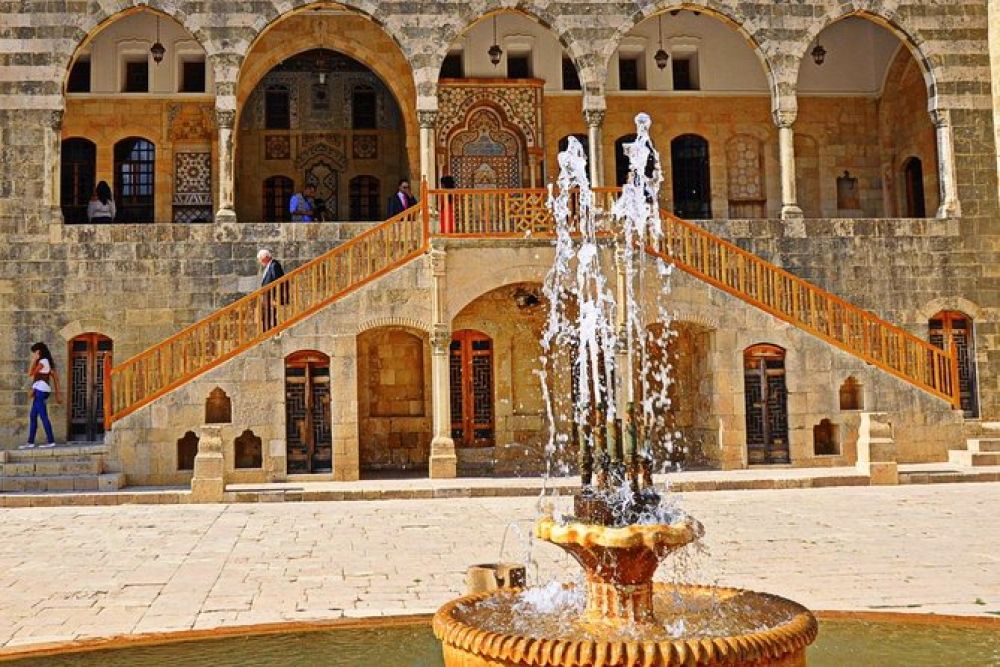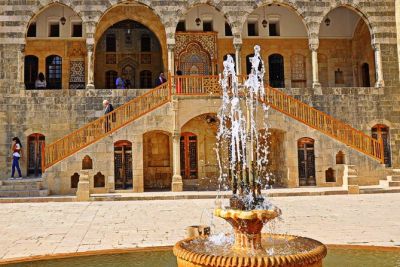

The Guided Historical Tour of the Beiteddine Palace is an immersive journey through Lebanon's rich history. As visitors walk the halls of this 19th-century palace, they are accompanied by a knowledgeable guide who unveils the secrets of the Emirs and the architectural wonders of this Italianate and Arabesque styled edifice. Marvel at the intricate mosaic floors, ornamental fountains, and lavish reception rooms such as the Hamadeh Room with its breathtaking views. The tour also includes a visit to the beautifully preserved private apartments of Emir Bashir, showcasing a mix of Ottoman and European décor, illustrating the cultural sophistication of the epoch. The guide will provide comprehensive background, sharing stories of the palace's construction, its historical significance, and its role in modern-day Lebanon.
Embark on a leisurely stroll through the exquisite gardens of the Beiteddine Palace. These gardens are meticulously maintained and feature a variety of flora that provides a lush, green backdrop to the stately architecture of the palace. Along the way, you will encounter picturesque fountains and pools that reflect the grandeur of this historical residence. The sound of water and the scent of blooming flowers make for a tranquil and enchanting experience. Visitors often find this outdoor exploration a perfect complement to the grandiose of the palace interiors. Benches are strategically placed throughout the gardens, inviting guests to pause and take in the serene ambiance. The visit to the gardens is as much a feast for the eyes as it is a tranquil respite for the soul.
For professional and amateur photographers alike, the Beiteddine Palace offers a Photography Excursion that is second to none. With intricate architectural details, vast gardens, and panoramic landscapes, the palace provides countless opportunities for capturing stunning images. Under the warm Mediterranean light, the palace's high arches, detailed mosaics, and classic courtyards come to life. Participants can experiment with light and shadow to highlight the time-stained stones and centuries-old beauty of the palace. This is an unguided activity, allowing for freedom of exploration and creativity. Photographers should be mindful of preserving the integrity of the site and respect any areas that may be off-limits for photography to ensure the preservation of this historical monument.
Beiteddine Palace is not just a site of historical contemplation; it's also a vibrant hub for cultural festivals and events, particularly during the summer months when the Beiteddine Art Festival takes place. The festival attracts local and international performers, offering a wide array of performances from concerts, theatre, dance, and opera. Set against the magnificent backdrop of the palace and its courtyards, each event is a unique celebration of culture. Visitors can experience world-class entertainment in one of the most spectacular settings in Lebanon. It is advisable to check the festival schedule ahead of time and purchase tickets for the specific events in advance, as these cultural gatherings are highly anticipated and well-attended.
Art and history admirers can indulge in periodic art exhibitions held in the Beiteddine Palace. These exhibitions showcase a range of artwork, from contemporary Lebanese artists to international historical collections temporarily on display. Art exhibition themes are often chosen to reflect the palace's storied past or the artistic heritage of Lebanon, providing visitors with an insightful fusion of art and history. Each curated exhibition offers a different perspective on the region's culture, making repeated visits to the palace a fresh and rewarding experience. The exhibitions are usually housed in one of the palace's galleries, with the space transformed into a temporary haven for art enthusiasts.
The Beiteddine Palace houses several museum exhibits within its premises, allowing visitors to delve deeper into Lebanese heritage. Exhibits cover a range of topics such as Byzantine mosaics, Ottoman-era weaponry, and traditional costumes. These well-preserved collections are displayed in various sections of the palace, and informative plaques narrate the items' historical and cultural significance. Tours might include the Emir's private apartments, adorned with original furniture, and the stables that now host the Mosaic Museum, which includes a superb collection of Byzantine mosaics unearthed in the surrounding countryside. These museum exhibits offer guests a tangible connection to the past, enhancing the overall experience with educational context that brings to life the grandeur of bygone eras.
Throughout the year, the Beiteddine Palace organizes a series of educational workshops that cater to both children and adults. These workshops cover various subjects from art and history to botany and conservation. For example, a mosaic workshop might teach the intricate process of creating traditional designs, thereby conserving this ancient Lebanese art form. Alternatively, a gardening workshop in the palace grounds might focus on the cultivation and care of the species found within the palace gardens. These workshops are typically led by professionals in the field and aim to provide participants with hands-on learning experiences that are both educational and enjoyable. Fees and registration details for these workshops vary, and interested visitors should enquire in advance to book a spot.
For those interested in the archeological aspects of Lebanese history, Beiteddine Palace offers visits to nearby archeological sites. These excursions are an extension of the palace experience and deepen visitors' understanding of the region's historical landscape. One can visit local digs and ruins that date back to various periods, revealing layers of history from Phoenician to Roman, Byzantine, and Arab eras. While exploring these sites, visitors will learn about the methods of ancient construction, the historical significance of the discovered artifacts, and the ongoing efforts to preserve them. These site visits are typically organized with an archeological expert who can provide a guided tour and answer questions about the discoveries.
Beiteddine Palace can offer visitors a taste of traditional Lebanese cuisine through various culinary experiences. These may include cooking classes led by a local chef or food tastings that feature a selection of Lebanon's finest dishes – such as tabbouleh, kibbeh, and baklava – paired with regional wines. Guests might also enjoy a garden-to-table experience, where they pick fresh ingredients and learn about the role of food in Lebanese culture and history. Culinary experiences are a delightful way to connect with the local culture, and they often end with a communal meal, providing a warm and welcoming atmosphere.
Experience the Beiteddine Palace in a different light with a Night Tour. These tours are special after-hours events that allow visitors to explore the palace illuminated under the stars. The moonlight and strategically placed lighting accentuate the palace's architecture, creating a magical and mysterious atmosphere. Night tours often include storytelling sessions, where tales of the palace's past and Lebanon's folklore are dramatically narrated, sometimes accompanied by traditional music. The starlit sky, the cool breeze, and the nighttime ambiance of the courtyard and gardens guarantee a memorable experience, different from the daytime tours.
